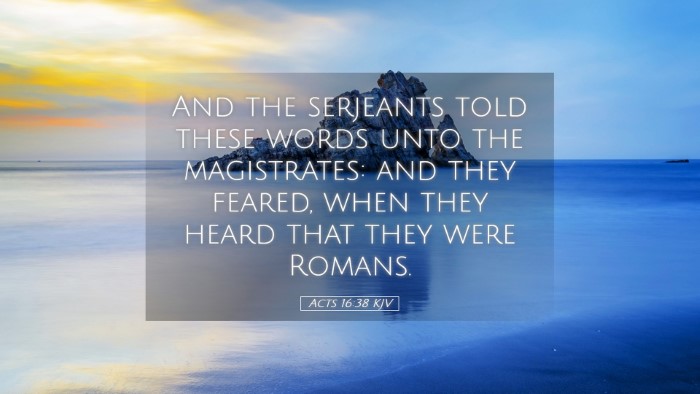Bible Commentary on Acts 16:38
In Acts 16:38, we find a significant moment concerning the Apostle Paul and his companion Silas during their missionary journey. The verse reads:
"And the sergeants told these words unto the magistrates: and they feared when they heard that they were Romans."
Contextual Overview
This verse occurs within a narrative where Paul and Silas had been imprisoned after casting out a spirit of divination from a slave girl. Their act had a profound impact on the local economy and, consequently, led to their arrest and trial.
Commentary Insights
1. The Fear of the Magistrates
Matthew Henry notes that the magistrates expressed fear when they realized Paul and Silas were Romans. This fear arises from the legal implications of violating the rights of a Roman citizen. Roman citizenship was a privilege that granted individuals certain protections, which included the right to a fair trial and protection against harsh punishments.
2. The Rights of Roman Citizens
Albert Barnes emphasizes the importance of understanding a Roman citizen's rights within the context of the Roman Empire. Violating these rights not only elicited fear among the magistrates but also posed significant repercussions for those in authority. The magistrates' fear stemmed from their potential need to answer for their actions to a higher power.
3. The Role of Citizenship in the Early Church
Adam Clarke expands this discussion by highlighting how Paul’s Roman citizenship played a crucial role in his mission and ministry. It afforded him protection and opened doors that could have been otherwise closed. As a citizen, Paul could appeal to his rights, using them strategically to advance the gospel message and protect fellow believers.
Theological Implications
- A. God’s Sovereignty: The events leading to this moment, including the imprisonment of Paul and Silas, reveal God’s sovereignty over all situations. The gospel message reaches diverse peoples through various means, including persecution.
- B. The Call to Justice: The apostolic example sets a precedent for calling upon justice, invoking the rights afforded by the system, and advocating for the truth of the gospel.
- C. Citizenship and Identity: This passage prompts reflection on the dual citizenship that believers hold: as citizens of their respective nations and as citizens of the Kingdom of God. Each identity carries responsibility and implications for how one lives and interacts with the world.
Exhortation for Pastors and Theologians
This moment in Acts 16:38 should encourage pastors and theologians to consider the pressing implications of civic duty and the pursuit of justice in their missional work. There is an innate calling to uphold righteousness, advocate for the downtrodden, and boldly proclaim the rights and truths of the Christian faith in a world often hostile to it.
Conclusion
Acts 16:38 serves as a poignant reminder of the intersection between faith and civic life. In understanding the dynamics of privilege and power in this narrative, modern readers can draw lessons on how to navigate their own contexts, championing justice and truth amidst formidable challenges while remaining steadfast in their commitment to the gospel.


